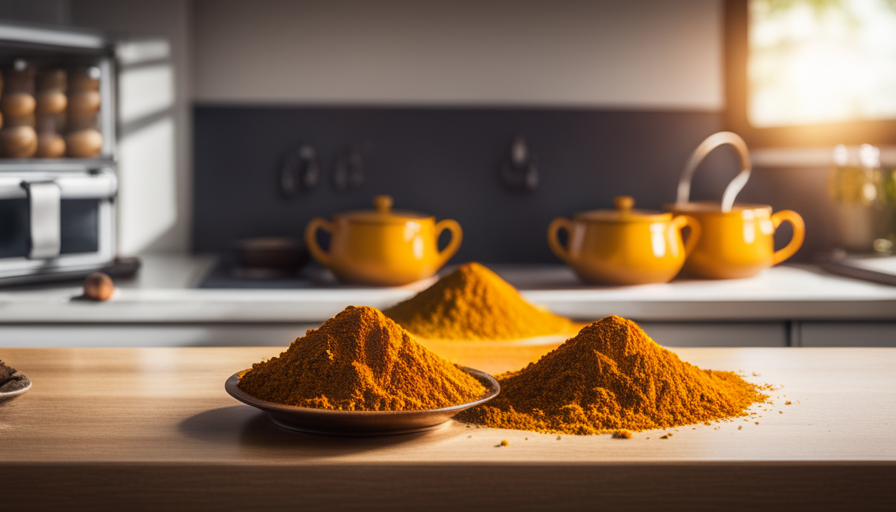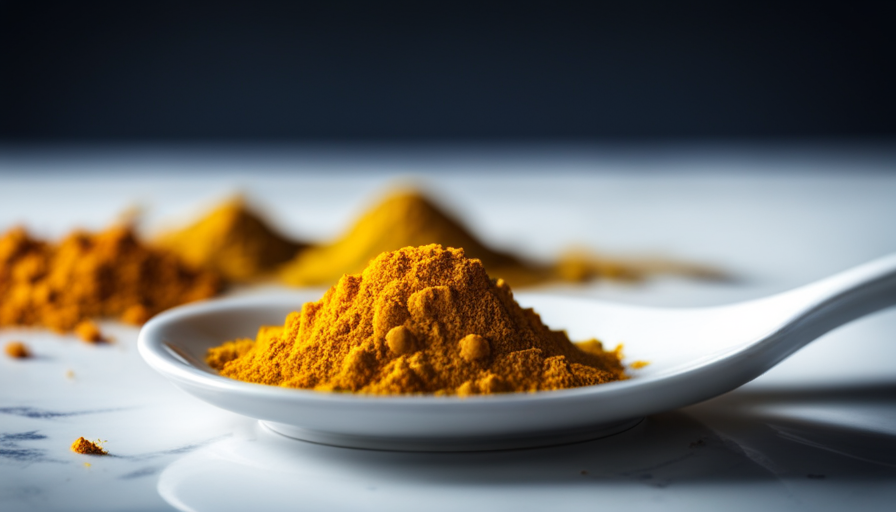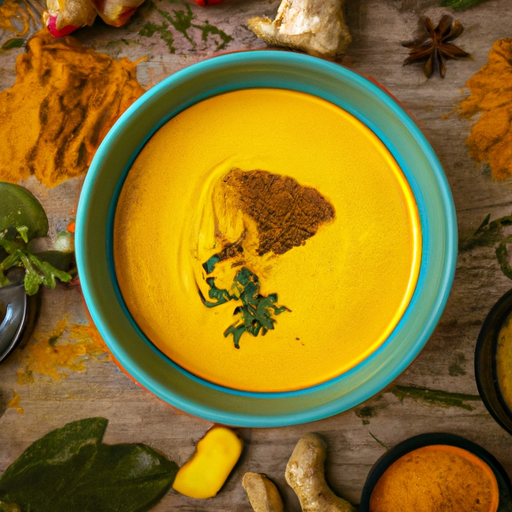Inflammation, a natural shield for our bodies, can become troublesome and cause lasting health problems. Enter turmeric, the golden spice with its potent curcumin compound renowned for fighting inflammation. Start your day right with a cozy mug of turmeric tea to enjoy its benefits in a soothing way. Discover the secrets of turmeric tea for a healthier you!
But how much turmeric tea should you consume for optimal inflammation relief? In this article, we will explore the recommended daily intake of turmeric tea, factors to consider for effective relief, and how to enhance its effects. We will also discuss how to listen to your body’s response and incorporate turmeric tea into your daily routine. Plus, we will touch on other forms of turmeric that can provide inflammation relief.
Get ready to harness the power of turmeric tea and take control of your inflammation woes!
Key Takeaways
- The recommended daily intake of turmeric tea for inflammation relief varies, but a general guideline is 1-2 cups per day.
- Starting with a lower dosage of turmeric tea and gradually increasing it over time is recommended to minimize risks and gauge effectiveness.
- Enhancing the absorption of curcumin, the active compound in turmeric, can maximize its anti-inflammatory effects. Combining turmeric tea with black pepper or fat can help enhance bioavailability.
- Monitoring inflammation symptoms and adjusting the dosage of turmeric tea based on individual needs allows for a more personalized approach to managing inflammation. Consulting with a healthcare professional is recommended before making any changes to the dosage.
The Benefits of Turmeric Tea for Inflammation
If you’re dealing with inflammation, sipping on a few cups of turmeric tea throughout the day can work wonders for soothing those achy joints and reducing any uncomfortable swelling. Turmeric, a vibrant yellow spice commonly found in curry dishes, has long been used in traditional medicine for its anti-inflammatory properties.
Scientific studies on turmeric tea have shown that it contains compounds called curcuminoids, with curcumin being the most active compound. Curcumin has been found to have powerful anti-inflammatory effects, targeting multiple pathways in the body that contribute to inflammation. It inhibits the production of inflammatory molecules and enzymes, and also blocks the activation of certain inflammatory proteins.
Understanding turmeric’s properties is key to harnessing its anti-inflammatory benefits. It’s important to note that curcumin is not well-absorbed by the body on its own, but combining turmeric with black pepper can significantly enhance its absorption.
With this understanding of the active compound in turmeric, let’s delve deeper into the various ways turmeric can help combat inflammation.
Understanding the Active Compound in Turmeric
Explore the benefits of turmeric by understanding the active compound that makes it so powerful, and discover how incorporating it into your daily routine can provide relief from inflammation.
The active compound in turmeric that gives it its potent anti-inflammatory properties is called curcumin. Curcumin has been shown to inhibit the activity of several enzymes that are involved in the inflammation process. It also acts as a powerful antioxidant, neutralizing free radicals and reducing oxidative stress in the body.
When it comes to reaping the benefits of turmeric for inflammation, dosage is an important factor to consider. While there is no set recommended dosage for turmeric tea, studies suggest that consuming 500 to 2,000 milligrams of curcumin per day may be beneficial for reducing inflammation. However, it’s important to note that curcumin is not easily absorbed by the body, and its bioavailability can be enhanced by consuming it with black pepper or fat.
Incorporating turmeric tea into your daily routine can be a simple and effective way to introduce curcumin into your diet. By enjoying a cup of turmeric tea each day, you can potentially reduce inflammation and experience the many other health benefits that turmeric has to offer.
Transitioning into the subsequent section about the recommended daily intake of turmeric tea, it’s important to consider the optimal amount of turmeric tea to consume for maximum benefits.
Recommended Daily Intake of Turmeric Tea
To maximize the benefits of turmeric tea, it’s important to consider the recommended daily intake in order to effectively incorporate this powerful anti-inflammatory drink into your routine. The recommended intake of turmeric tea varies depending on factors such as individual health conditions and goals. However, a general guideline suggests consuming 1-2 cups of turmeric tea per day. This amount provides an adequate dosage of curcumin, the active compound in turmeric responsible for its anti-inflammatory properties.
To help visualize the recommended daily intake, here is a table showcasing the potential benefits and risks of consuming different amounts of turmeric tea:
| Daily Intake | Potential Benefits | Potential Risks |
|---|---|---|
| 1 cup | Reduced inflammation, improved digestion | Minimal side effects |
| 2 cups | Enhanced joint health, boosted immunity | Mild gastrointestinal discomfort in some cases |
It’s important to note that exceeding the recommended intake may not necessarily lead to better results and could potentially cause adverse effects. Therefore, it’s crucial to consult with a healthcare professional before significantly increasing your turmeric tea consumption.
Considering the recommended intake is just one factor to consider for effective inflammation relief.
Factors to Consider for Effective Inflammation Relief
One important aspect to consider for achieving effective relief from inflammation is understanding the various factors that can contribute to its occurrence. When it comes to inflammation, there are several factors that can impact its severity and duration. By considering these factors, you can develop effective relief strategies that work best for you.
Factors to Consider for Effective Relief Strategies:
-
Underlying Health Conditions: Certain health conditions, such as arthritis or autoimmune diseases, can contribute to chronic inflammation. It’s important to address these conditions in conjunction with using turmeric tea for relief.
-
Lifestyle Choices: Factors like diet, exercise, and stress levels can all influence inflammation. Making healthy choices such as consuming an anti-inflammatory diet, engaging in regular exercise, and managing stress can enhance the effects of turmeric tea.
-
Dosage and Frequency: The amount of turmeric tea consumed and how often it’s consumed can impact its effectiveness. It’s recommended to start with a lower dosage and gradually increase it based on individual response.
Considering these factors can help optimize the benefits of turmeric tea for inflammation relief. By understanding the underlying causes and making lifestyle adjustments, you can enhance the effects of turmeric tea and further promote inflammation relief.
Enhancing the Effects of Turmeric Tea
By considering these factors, I can optimize the benefits of turmeric tea and enhance its effects on relieving inflammation. One important factor to consider is enhancing the absorption of turmeric in the body. Turmeric contains a compound called curcumin, which has low bioavailability. To increase absorption, it’s recommended to consume turmeric tea with a source of fat, such as coconut oil or black pepper. The fat helps to improve the absorption of curcumin into the bloodstream, maximizing its anti-inflammatory effects.
Another factor to consider is combining turmeric tea with other anti-inflammatory herbs. Some herbs, like ginger and cinnamon, also possess anti-inflammatory properties. Combining these herbs with turmeric can create a synergistic effect, enhancing the overall anti-inflammatory benefits. For example, adding a slice of fresh ginger or a sprinkle of cinnamon to a cup of turmeric tea can not only enhance the flavor but also boost the tea’s effectiveness in reducing inflammation.
By enhancing absorption and combining turmeric tea with other anti-inflammatory herbs, individuals can optimize the benefits of turmeric tea for relieving inflammation. However, it’s important to note that turmeric tea may have potential side effects and precautions, which we’ll discuss in the subsequent section.
Potential Side Effects and Precautions
Be careful, though, because like every good thing, there can be a few bumps along the road when it comes to enjoying the benefits of turmeric tea. While turmeric tea is generally safe for most people when consumed in moderation, it’s important to be aware of potential risks and take necessary precautions.
Firstly, some individuals may experience mild side effects such as an upset stomach or diarrhea when consuming large amounts of turmeric tea. To minimize these risks, it’s recommended to start with a lower dosage and gradually increase it over time. The recommended dosage of turmeric tea for inflammation is usually 1-2 cups per day. However, it’s always best to consult with a healthcare professional, especially if you have any underlying health conditions or are taking medications.
Additionally, turmeric may interact with certain medications, such as blood thinners, and can have a blood-thinning effect. Therefore, it’s crucial to talk to your doctor before incorporating turmeric tea into your daily routine if you’re on any medications.
While turmeric tea can provide numerous benefits for inflammation, it’s important to be mindful of potential risks and follow the recommended dosage. Listening to your body’s response is key in ensuring that you’re getting the most out of turmeric tea without any adverse effects.
Listening to Your Body’s Response
When it comes to incorporating turmeric tea into my daily routine for inflammation, I find it crucial to listen to my body’s response.
Monitoring inflammation symptoms allows me to gauge the effectiveness of the tea and make necessary adjustments to the dosage.
Each individual’s needs may vary, so it’s important to be mindful of how much turmeric tea is needed to achieve the desired results.
Monitoring Inflammation Symptoms
One way to keep track of inflammation symptoms is by jotting them down in a journal. This allows you to monitor inflammation levels and track inflammatory symptoms over time. By doing so, you can identify any patterns or triggers that may be exacerbating your inflammation.
To help you further understand the significance of monitoring inflammation symptoms, here are five key points to consider:
- Inflammation can manifest in different ways, such as joint pain, swelling, redness, or fatigue.
- Tracking your symptoms can help you determine if certain foods, activities, or environmental factors are contributing to your inflammation.
- It allows you to assess the effectiveness of different interventions, such as turmeric tea, in reducing inflammation symptoms.
- Regularly monitoring your symptoms can empower you to make informed decisions about your health and treatment options.
- By keeping a journal, you can communicate your observations to your healthcare provider, facilitating a more personalized approach to managing inflammation.
Understanding the importance of monitoring inflammation symptoms, we can now explore how to adjust turmeric tea dosage based on individual needs.
Adjusting Dosage Based on Individual Needs
To tailor the dosage of turmeric tea to individual needs, it’s important to consider factors such as overall health, lifestyle, and any specific conditions or medications. Adjusting the dosage allows for a more personalized treatment approach for managing inflammation.
While there’s no one-size-fits-all answer, research suggests that consuming 500 to 2,000 milligrams of curcumin, the active compound in turmeric, per day may help reduce inflammation. However, it’s always best to consult with a healthcare professional before making any changes to your turmeric tea dosage. They can provide guidance based on your specific health needs and help monitor your progress.
Incorporating turmeric tea into your daily routine can be a beneficial step towards managing inflammation and promoting overall wellness.
Incorporating Turmeric Tea into Your Daily Routine
When it comes to incorporating turmeric tea into my daily routine, I find it helpful to explore different brewing techniques and recipe ideas. By experimenting with different methods, I can find the one that suits my taste preferences and allows me to enjoy the maximum benefits of turmeric.
Additionally, understanding the storage and shelf life of turmeric tea is important to ensure that I’m consuming it at its freshest and most potent state. This knowledge helps me plan ahead and make the most of this incredible spice in my daily routine.
Brewing Techniques and Recipe Ideas
If you’re looking for a simple way to soothe inflammation, why not try brewing yourself a warm and comforting cup of turmeric tea? It’s not only delicious, but it also offers numerous health benefits. Here are a few brewing tips to help you make the perfect cup of turmeric tea:
- Use fresh turmeric root or high-quality turmeric powder for the best flavor and health benefits.nn2. Add a pinch of black pepper to enhance the absorption of curcumin, the active compound in turmeric.nn3. Steep the tea for at least 10 minutes to allow the flavors and beneficial compounds to fully infuse.
By following these brewing techniques, you can ensure that you’re getting the most out of your turmeric tea.
Now, let’s move on to the next section and learn about the storage and shelf life of turmeric tea.
Storage and Shelf Life of Turmeric Tea
The storage and shelf life of turmeric tea can be extended by keeping it in an airtight container in a cool, dark place. This helps preserve its freshness and potency. It’s important to protect turmeric tea from moisture, heat, and light, as these factors can degrade its quality over time.
By following these storage tips, you can ensure that your turmeric tea remains flavorful and effective for a longer period.
Aside from its long shelf life, turmeric tea offers numerous health benefits. It contains a compound called curcumin, which has powerful anti-inflammatory properties. Regular consumption of turmeric tea may help reduce inflammation in the body and alleviate symptoms associated with conditions like arthritis and chronic pain.
Additionally, curcumin has antioxidant properties that can protect against oxidative stress and support overall well-being.
Transitioning into the subsequent section about other forms of turmeric for inflammation relief, it’s important to explore alternative options that can provide similar benefits.
Other Forms of Turmeric for Inflammation Relief
I’ve found that incorporating other forms of turmeric into my daily routine can provide additional relief from inflammation. Supplements and capsules are a convenient option for those who may not enjoy the taste of turmeric tea or want a more concentrated dose.
Golden milk, a warm beverage made with turmeric and milk, is another delicious way to reap the anti-inflammatory benefits of turmeric.
Lastly, turmeric smoothies are a refreshing and nutritious way to incorporate this powerful spice into my diet.
Supplements and Capsules
Supplements and capsules offer a convenient way to incorporate turmeric tea into your daily routine for combating inflammation. Not only do they provide a concentrated dose of curcumin, the active compound in turmeric, but they also eliminate the need for brewing tea or preparing other forms of turmeric. When choosing a turmeric supplement or capsule, it is important to consider the dosage. The recommended dosage for turmeric supplements typically ranges from 500 to 2,000 milligrams per day. However, it is always best to consult with a healthcare professional to determine the appropriate dosage for your specific needs. Capsules have the added benefit of being easy to swallow and often come in a standardized form, ensuring consistent curcumin levels. These supplements can be seamlessly incorporated into your daily routine, making it easier to reap the anti-inflammatory benefits of turmeric. Moving on to golden milk and turmeric smoothies, these delicious concoctions provide another tasty option for incorporating turmeric into your diet.
Golden Milk and Turmeric Smoothies
To fully enjoy the benefits of turmeric, you may consider indulging in the delights of golden milk or refreshing turmeric smoothies. These provide a delectable and nourishing way to incorporate this powerful spice into your daily routine.
Golden milk, a traditional Ayurvedic beverage, combines turmeric with warm milk and other spices like ginger and cinnamon. It’s known for its anti-inflammatory properties and may help relieve pain and inflammation.
Turmeric smoothies, on the other hand, offer a refreshing twist. They blend turmeric with fruits like pineapple, mango, and banana, along with ingredients like coconut milk or yogurt. These smoothies not only provide the anti-inflammatory benefits of turmeric but also offer a dose of vitamins, minerals, and antioxidants from the fruits.
By enjoying golden milk or turmeric smoothies, you can easily harness the power of turmeric to promote overall well-being.
Moving forward to the conclusion: harnessing the power of turmeric tea for inflammation…
Conclusion: Harnessing the Power of Turmeric Tea for Inflammation
Utilizing turmeric tea as a daily dose of defense against inflammation can be a potent and powerful practice. Turmeric has long been recognized for its anti-inflammatory properties, and incorporating it into your daily routine can help reduce inflammation and promote overall health.
When it comes to harnessing turmeric’s potential, it’s important to find the right dosage that works for you. Here are some key points to consider:
-
Start with a small amount: Begin by adding a teaspoon of turmeric powder to your tea and gradually increase the amount over time. This allows your body to adjust to the turmeric and helps you find the most effective dosage.
-
Listen to your body: Pay attention to how your body responds to turmeric tea. If you experience any discomfort or side effects, it may be a sign that you need to adjust the dosage.
-
Consistency is key: To experience the full benefits of turmeric tea, it’s important to consume it consistently. Make it a part of your daily routine to maximize its anti-inflammatory effects.
-
Consult a healthcare professional: If you have any underlying health conditions or are taking medications, it’s always a good idea to consult with a healthcare professional before incorporating turmeric tea into your daily routine. They can provide personalized advice and guidance on the most effective dosage for your specific needs.
By harnessing the potential of turmeric tea and finding the right dosage, you can effectively combat inflammation and promote overall well-being. Cheers to a healthy and inflammation-free lifestyle!
Frequently Asked Questions
Can turmeric tea be consumed in excessive amounts?
Excessive consumption of turmeric tea can potentially pose health risks. While turmeric tea has numerous health benefits, consuming it in excessive amounts may lead to digestive issues, such as stomach upset or diarrhea.
Additionally, turmeric contains a compound called curcumin, which has blood-thinning properties. Consuming excessive amounts of turmeric tea could potentially increase the risk of bleeding, especially for individuals on blood-thinning medications.
It’s important to enjoy turmeric tea in moderation and consult with a healthcare professional for personalized advice.
Are there any specific dietary restrictions when consuming turmeric tea for inflammation?
When it comes to consuming turmeric tea for inflammation, it’s important to be mindful of any potential dietary restrictions. While there aren’t any specific restrictions, it’s always a good idea to consult with a healthcare professional, especially if you have any pre-existing conditions or you’re taking medications.
As for the optimal dosage, studies suggest that consuming 1-2 cups of turmeric tea per day may help reduce inflammation. However, it’s important to remember that individual needs may vary, so it’s best to find the dosage that works best for you.
Can turmeric tea interact with any medications?
Turmeric tea can interact with certain medications and may cause potential side effects. It’s important to consult with a healthcare professional before consuming turmeric tea, especially if you’re taking any medications.
Turmeric can increase the risk of bleeding when taken with blood thinners like warfarin. It may also interact with drugs that are metabolized by the liver, potentially affecting their effectiveness.
Always prioritize your safety and consult a healthcare professional for personalized advice.
Is it safe to consume turmeric tea while pregnant or breastfeeding?
During pregnancy and breastfeeding, it’s generally safe to consume turmeric tea in moderate amounts. However, it’s important to consult with your healthcare provider before adding any new herbal tea to your diet. Turmeric tea has been used for centuries and is known for its anti-inflammatory properties. It contains a compound called curcumin, which may help reduce inflammation. However, more research is needed to fully understand its effects during pregnancy and breastfeeding.
What are some potential allergic reactions to turmeric tea and how can they be identified?
Allergic reactions to turmeric tea can be quite dramatic, leaving you feeling like you’ve been stung by a thousand bees! These reactions can include hives, itching, swelling, and difficulty breathing. It’s important to watch out for these symptoms after consuming turmeric tea. If you suspect an allergic reaction, seek medical attention immediately.
To identify allergic reactions, pay attention to any changes in your body after drinking turmeric tea and consult with a healthcare professional for proper diagnosis and treatment.
Conclusion
In conclusion, incorporating turmeric tea into your daily routine can be a beneficial way to combat inflammation. Studies have shown that curcumin, the active compound in turmeric, has powerful anti-inflammatory properties. It’s recommended to consume 1-3 cups of turmeric tea per day to reap its potential benefits.
Interestingly, a study published in the Journal of Clinical Psychopharmacology found that curcumin may also improve mood and cognitive function. So, not only can turmeric tea help with inflammation, but it may also have positive effects on mental health.
Keep in mind that everyone’s body responds differently, so listen to your body’s cues and adjust your intake accordingly.










